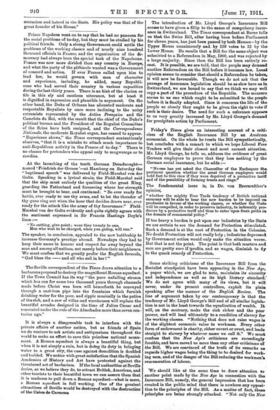Prince Napoleon went on to say that he had no
panacea for the social problems of to-day, but they must be studied by his political friends. Only a strong Government could settle the problems of the working classes and of nearly nine hundred thousand officials in France, and the organization of the de- mocracy had always been the special task of the Napoleons. France was now more divided than any country in Europe, and what the party of the plebiscite wanted was a Government of concord and action. If ever France called upon him to lead her, he would govern with men of character and experience, including, he added, many Republi- cans who had served their country in various capacities during the last thirty years. There is no hint of the clarion or fife in this sly and cautious utterance, but at least it is dignified in expression and plausible in argument. On the other hand, the Duke of Orleans has alienated moderate and respectable Royalists by once more inclining to the noisy extremists represented by the Action Francaise and the Camelots du Roi, with the result that the chief of the Duke's political bureau and the President of the Royalist Committee of the Seine have both resigned, and the Correspondance Nationale, the moderate Royalist organ, has ceased to appear. "Experience shows," the Times correspondent sententiously observes, " that it is a mistake to attach much importance to anti-Republican activity in the France of to-day." There is no chance for pretenders who appeal only to mugwumps or to rowdies.










































 Previous page
Previous page